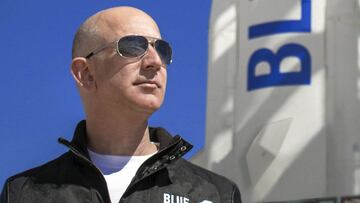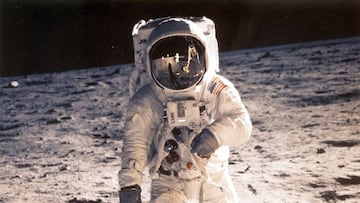SPACE
When is Jeff Bezos’ Blue Origin scheduled for first trip to land astronauts on the Moon?
On Friday it was announced that a team led by the space company had won a NASA contract to build a spacecraft to make the journey.

The space race used to refer to that period of intense rivalry between the United States of America and the Soviet Union during the Cold War era. It was indeed a race to achieve significant milestones in space exploration, particularly in human spaceflight and lunar missions and really kicked off on October 4, 1957, when the Soviets successfully launched the world’s first artificial satellite, Sputnik 1, into orbit.
You know what happened next. Eisenhower creates NASA; Gagarin then Shepard go up; Tereshkova, Glenn and Leonov make history; Kennedy sets up Apollo; Armstrong and Aldrin make their mark, literally -- and then an effective truce resulted in the International Space Station and collaborative efforts.
Fastest history lesson ever.

Blue Origin wins NASA contract
In recent years, the space race has been more about which mega-rich individual, company or state can make the biggest impact and on Friday we heard the latest development from inside the States. Blue Origin, the space company founded by billionaire Jeff Bezos, has secured a significant contract from NASA to develop a crewed lunar lander for the agency’s Artemis program.
Following the official announcement, Bezos tweeted that he was “honored to be on this journey with NASA to land astronauts on the Moon — this time to stay.
“Together, we’ll be solving the boil-off problem and making LOX-LH2 a storable propellant combination, pushing forward the state of the art for all deep space missions,” he added.
When will Blue Origin first land astronauts on the Moon?
Although it is impossible to determine exactly when the first landing will take place, the serious work starts now, the early expectation is that Bezos’ team will be able to put astronauts onto the moon’s surface later this decade, following in those famous footsteps of decades before.
The contract is valued at just over $3.4 billion, according to NASA officials. However, Blue Origin’s Vice President, John Couluris, has indicated that the company’s contribution will exceed the contract’s value by a substantial amount. This suggests that Blue Origin is committed to investing heavily in the project, potentially exceeding $7 billion overall. This level of commitment demonstrates the company’s ambition and determination to play a vital role in lunar exploration.
Remember that this battle for a second crew landing contract came about after SpaceX, owned by Elon Musk, picked up the first one back in 2021.

Who forms the Blue Origin team?
To accomplish this mission, Blue Origin has assembled a formidable team of partners, including industry giants such as Lockheed Martin and Boeing. Collaborating with Draper, Astrobotic, and Honeybee Robotics, Blue Origin has created a diverse consortium of expertise to tackle the challenges of lunar landing technology.
Blue Origin’s victory comes at the expense of a team led by Dynetics, owned by Leidos. While other proposals were anticipated, the details of these alternative bids remain undisclosed until NASA releases documents explaining its selection process.
This contract win not only solidifies Blue Origin’s position as a major player in the space industry but also opens up new possibilities for human exploration of the moon. With significant funding and a strong team, Blue Origin is poised to make significant contributions to NASA’s Artemis program, paving the way for an exciting era of crewed missions and scientific advancements on the lunar surface.
To the Moon, then to Mars
As NASA Administrator Bill Nelson said during the contract awarding: “We’re making an additional investment in the infrastructure that will pave the way to land the first humans on Mars.
“Our shared ambitions now are no less lofty than when President Kennedy dared a generation of dreamers to journey to the moon.”






